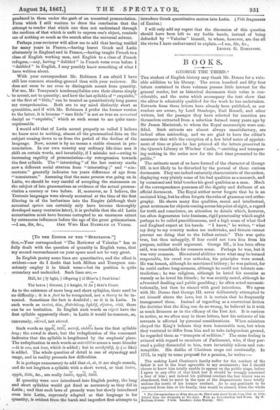[To THE EDITOR OF THE "SPECTATOR. "]
$&R;—Your correspondent "The Reviewer of Valerius " has so fully dealt with the question of quantity in English verse, that toy second encroachment on your space need not be very great.
In English poetry some lines are quantitative, and the effect is cvident—nor do I doubt that both Milton and Tennyson con- sciously employ it in blank verse—but its position is quite -secondary and undecided. Such lines are, - Hail, ho Iv light, H offspring I Of Heav'n If first born
This brave Garen; a knight, of Ar1 thar's Court.
As to the existence of mere long and short syllables, there need be no difficulty ; it is a fact to be recognized, not a theory to be in- vented. Sometimes the fact is doubtful ; so it is in Latin. In such words as invent, aim, flourishing, lightly, sojourn, viStt, there can be no hesitation. In English such words as regret have the first syllable apparently short ; in Latin it would be common, so, Conversely, saered, not sacred.
%.1
Such words as apple, merry', sadden have the first syllable long; the vowel is short, but the reduplication of the consonant indicates that the syllable is lengthened by the emphasis' place. The reduplication in such words as marvellous seems a mere blunder —it is ous, not loos, which is added ; but in narthftllg, ly (= like) is added. The whole question of detail is one of etymology and usage, and in reality presents few difficulties.
It is perhaps unnecessary to add that ch,sh, th are single sounds, and do not lengthen a syllable with a short vowel, or that lustre, .apple, little, &c., are really luster, cippel, If quantity were once introduced into English poetry, the long and short syllables would get fixed as accurately as they did in Latin ; and that such laws of prosody were but slowly introduced -even into Latin, supremely adapted as that language is for quantity, is evident from the harsh and imperfect first attempts to
introduce Greek quantitative metres into Latin. ( Vide fragments of Ennius.) I will only add my regret that the discussion of this question should have been left to my feeble hands, instead of being defended by " Valerius" himself, to whom, however, are due all the views I have endeavoured to explain.—I am, Sir, &c.,
LIONEL G. ROBINSON.






























 Previous page
Previous page